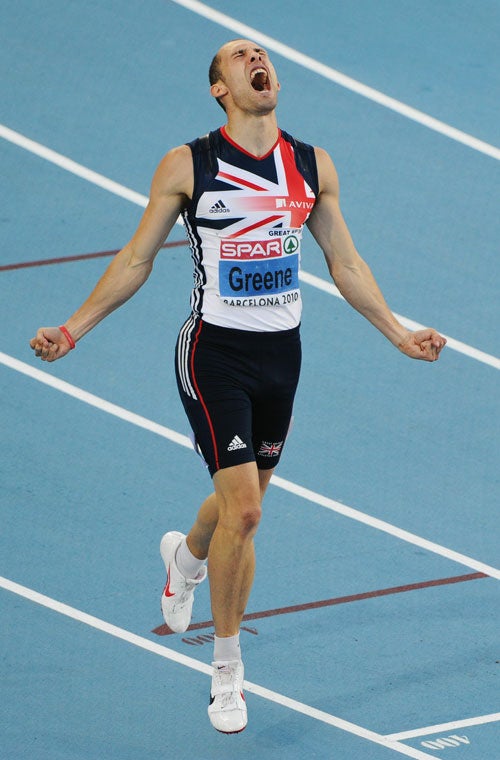Britain's golden medal haul: That's how you do it!
British athletes put wealthy footballers to shame with medal-winning romp at the European championships

Britain's athletes restored pride to the nation's sporting reputation yesterday with another haul of medals at the European Championships in Barcelona, setting the scene for one of the UK's most successful games ever.
Unlike their low-achieving footballing compatriots, who flopped for England at last month's World Cup, Great Britain's athletes have proved world-beaters on low pay and meagre budgets. Some have had their lottery funding cut, and many earn less in a year than John Terry earns in a week.
Leading the charge were the heptathlete Jessica Ennis and middle-distance runner Mo Farah, both taking gold with stunning performances. Ennis threw a new personal best in the javelin to hold off the challenge from the Ukrainian Nataliya Dobrynska yesterday afternoon.
Then, last night, she comfortably won the last of her seven events – the 800m – to add the European gold, and a new championship record of 6823 points, to her 2009 World Championship victory.
Farah became only the tenth male atlete ever to take 5,000 and 10,000 metre gold in the same European, World or Olympic championships when he won the 5,000m last night. Earlier in the week he took Britain's first ever gold medal in the 10,000m at any championships, with his friend and rival Chris Thompson taking silver.
Phillips Idowu won the triple jump and Andy Turner struck gold in the 110m hurdles. In addition to the six golds, there have been six British silvers and four bronzes, bringing Britain's medal tally to 16.
Last night David ("Dai") Greene and Rhys Williams won gold and silver respectively in the men's 400m hurdles, while Michael Rimmer, the 24-year-old Liverpudlian who has been dogged by injury, showed his credentials with silver in the 800m.
The Great Britain team is now edging ahead of France for second place in the overall medals table; France has five golds, one silver and three bronze. It is the best medal haul since 1998's total of 16. Britain's best ever European Championships was in 1990 when the team took home 18 medals, a figure that could be equalled today. The Russians are way out in first place with 21 medals, and Germany – Britain's enduring sporting nemesis – was pleasingly in fourth place last night.
Roger Black, the former 400m sprinter who won two European Championship golds and a silver at the Olympics, said: "This week has been a reason to celebrate. Some of the performances have been fantastic – although we seriously have to keep our feet on the ground in terms of how much harder it will become in the Olympics.
"What's encouraging is that, aside from Jessica Ennis and Phillips Idowu, some of the people who aren't so well known have taken the opportunity to win medals. These are dedicated people who don't get paid large amounts of money. That's the main difference between football and athletics. With athletics, you have to win to get paid more. With football, you can lose and you still get your £100,000 a week. I don't know the exact figures, but only a few athletes will be able to make that in a year – and they have to be world champions."
Andy Turner hurdled to first place, despite the blow of having his lottery support funding cut two years ago – slashed because it was deemed he was unlikely to get to a major final.
"For all the million downs you have, a day like today makes it all worthwhile," he said.
Jason Henderson, the editor of Athletics Weekly, said: "Success is rewarded with funding, but it could be argued that you need the funding to help athletes to move up in the first place. It can be very tough at the start. You can compare these European athletics championships with the football European championships that come around every four years: England will get dunked out early in the football, but there is a medal-fest in athletics."
The runner Will Cockerell, who is the general secretary of the Belgrave Harriers, one of the most successful clubs in Britain, said: "Athletics is run by enthusiastic volunteers who give up hours and hours of their time for it. There is a new interest in the sport, because the Olympics is coming here and everybody who is in their twenties will have a dream about competing.
"Not many will get really wealthy, though. If you look at Jenny Meadows, running in the 800m on Friday night, you could argue that she has the same ability in her craft as John Terry does in his, but he will earn what she does in a whole year over just a few days. Something like £30,000."
The flamboyant cool and medal-winning performances of Idowu – the triple-jumper with the red hair – means he will be able to command a better salary than some of the runners in the city's Olympic Stadium this week. Paula Radcliffe will have also benefited from endorsement deals and funding during her career. But experts said even a well-known face would not pave the way for sponsorships to match those enjoyed by footballers.
Parker Morse, a freelance columnist for the International Association of Athletics Federations, said: "Farah is a great example of the kind of sacrifice needed. He changed his entire lifestyle, pretty much became a monk, to get to where he is. We don't see many people these days who choose the harder course because they believe that doing something the best they can is more important than following the easy course, and that's something worth celebrating, no matter where we find it."
Subscribe to Independent Premium to bookmark this article
Want to bookmark your favourite articles and stories to read or reference later? Start your Independent Premium subscription today.

Join our commenting forum
Join thought-provoking conversations, follow other Independent readers and see their replies